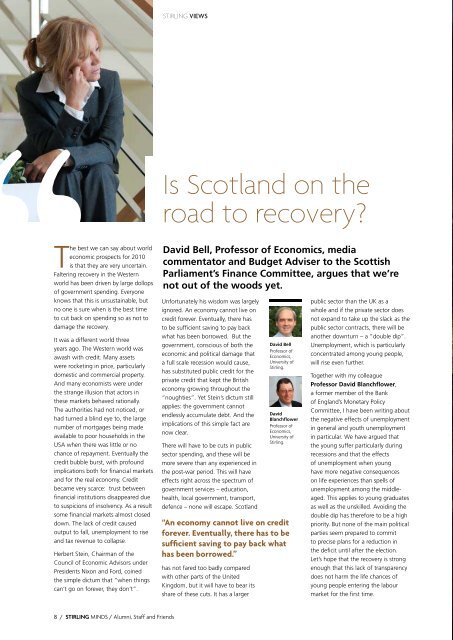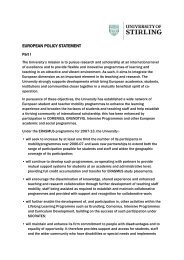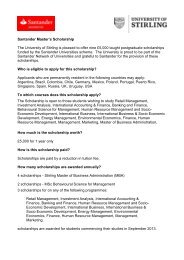Stirling Minds 2010 - University of Stirling
Stirling Minds 2010 - University of Stirling
Stirling Minds 2010 - University of Stirling
Create successful ePaper yourself
Turn your PDF publications into a flip-book with our unique Google optimized e-Paper software.
<strong>Stirling</strong> views<br />
Is Scotland on the<br />
road to recovery?<br />
Behavioural scientist Betsy<br />
Herrelko has made the<br />
chimpanzees <strong>of</strong> Edinburgh<br />
Zoo into film stars after she<br />
taught them how to use touchscreen<br />
technology.<br />
Given a chimp-pro<strong>of</strong> camera to<br />
shoot their own footage, a BBC<br />
Natural World documentary<br />
showed, for the first time, the<br />
world through a chimp’s eyes.<br />
Betsy explained how the chimps<br />
reacted to this new experience:<br />
“The Chimpcam Project was<br />
designed to let the chimps take<br />
us on a tour <strong>of</strong> their minds. We<br />
created studies and activities, but<br />
what happened after that was<br />
completely up to the chimps. We<br />
were along for the ride, hoping<br />
to learn a bit more about how<br />
they viewed the world. Being<br />
able to view life as the chimps<br />
see it is something that I will<br />
never forget.”<br />
Betsy is undertaking a PhD in the<br />
Department <strong>of</strong> Psychology under<br />
the supervision <strong>of</strong> Dr Sarah-Jane<br />
Vick and Pr<strong>of</strong>essor Hannah<br />
Buchanan-Smith. Originally from<br />
Ohio, she joined the Behaviour<br />
and Evolution Research Group at<br />
<strong>Stirling</strong> in 2008 after conducting<br />
research with the Gorilla<br />
Foundation in California.<br />
The best we can say about world<br />
economic prospects for <strong>2010</strong><br />
is that they are very uncertain.<br />
Faltering recovery in the Western<br />
world has been driven by large dollops<br />
<strong>of</strong> government spending. Everyone<br />
knows that this is unsustainable, but<br />
no one is sure when is the best time<br />
to cut back on spending so as not to<br />
damage the recovery.<br />
It was a different world three<br />
years ago. The Western world was<br />
awash with credit. Many assets<br />
were rocketing in price, particularly<br />
domestic and commercial property.<br />
And many economists were under<br />
the strange illusion that actors in<br />
these markets behaved rationally.<br />
The authorities had not noticed, or<br />
had turned a blind eye to, the large<br />
number <strong>of</strong> mortgages being made<br />
available to poor households in the<br />
USA when there was little or no<br />
chance <strong>of</strong> repayment. Eventually the<br />
credit bubble burst, with pr<strong>of</strong>ound<br />
implications both for financial markets<br />
and for the real economy. Credit<br />
became very scarce: trust between<br />
financial institutions disappeared due<br />
to suspicions <strong>of</strong> insolvency. As a result<br />
some financial markets almost closed<br />
down. The lack <strong>of</strong> credit caused<br />
output to fall, unemployment to rise<br />
and tax revenue to collapse.<br />
Herbert Stein, Chairman <strong>of</strong> the<br />
Council <strong>of</strong> Economic Advisors under<br />
Presidents Nixon and Ford, coined<br />
the simple dictum that “when things<br />
can’t go on forever, they don’t”.<br />
David Bell, Pr<strong>of</strong>essor <strong>of</strong> Economics, media<br />
commentator and Budget Adviser to the Scottish<br />
Parliament’s Finance Committee, argues that we’re<br />
not out <strong>of</strong> the woods yet.<br />
Unfortunately his wisdom was largely<br />
ignored. An economy cannot live on<br />
credit forever. Eventually, there has<br />
to be sufficient saving to pay back<br />
what has been borrowed. But the<br />
government, conscious <strong>of</strong> both the<br />
economic and political damage that<br />
a full scale recession would cause,<br />
has substituted public credit for the<br />
private credit that kept the British<br />
economy growing throughout the<br />
“noughties”. Yet Stein’s dictum still<br />
applies: the government cannot<br />
endlessly accumulate debt. And the<br />
implications <strong>of</strong> this simple fact are<br />
now clear.<br />
There will have to be cuts in public<br />
sector spending, and these will be<br />
more severe than any experienced in<br />
the post-war period. This will have<br />
effects right across the spectrum <strong>of</strong><br />
government services – education,<br />
health, local government, transport,<br />
defence – none will escape. Scotland<br />
has not fared too badly compared<br />
with other parts <strong>of</strong> the United<br />
Kingdom, but it will have to bear its<br />
share <strong>of</strong> these cuts. It has a larger<br />
David Bell<br />
Pr<strong>of</strong>essor <strong>of</strong><br />
Economics,<br />
<strong>University</strong> <strong>of</strong><br />
<strong>Stirling</strong>.<br />
David<br />
Blanchflower<br />
Pr<strong>of</strong>essor <strong>of</strong><br />
Economics,<br />
<strong>University</strong> <strong>of</strong><br />
<strong>Stirling</strong>.<br />
“An economy cannot live on credit<br />
forever. Eventually, there has to be<br />
sufficient saving to pay back what<br />
has been borrowed.”<br />
public sector than the UK as a<br />
whole and if the private sector does<br />
not expand to take up the slack as the<br />
public sector contracts, there will be<br />
another downturn – a “double dip”.<br />
Unemployment, which is particularly<br />
concentrated among young people,<br />
will rise even further.<br />
Together with my colleague<br />
Pr<strong>of</strong>essor David Blanchflower,<br />
a former member <strong>of</strong> the Bank<br />
<strong>of</strong> England’s Monetary Policy<br />
Committee, I have been writing about<br />
the negative effects <strong>of</strong> unemployment<br />
in general and youth unemployment<br />
in particular. We have argued that<br />
the young suffer particularly during<br />
recessions and that the effects<br />
<strong>of</strong> unemployment when young<br />
have more negative consequences<br />
on life experiences than spells <strong>of</strong><br />
unemployment among the middleaged.<br />
This applies to young graduates<br />
as well as the unskilled. Avoiding the<br />
double dip has therefore to be a high<br />
priority. But none <strong>of</strong> the main political<br />
parties seem prepared to commit<br />
to precise plans for a reduction in<br />
the deficit until after the election.<br />
Let’s hope that the recovery is strong<br />
enough that this lack <strong>of</strong> transparency<br />
does not harm the life chances <strong>of</strong><br />
young people entering the labour<br />
market for the first time.<br />
zootube<br />
Find out more at<br />
www.chimpcam.com<br />
8 / <strong>Stirling</strong> minds / Alumni, Staff and Friends<br />
Image courtesy <strong>of</strong> Burning Gold Productions<br />
www.stirlingminds.stir.ac.uk / 9

















